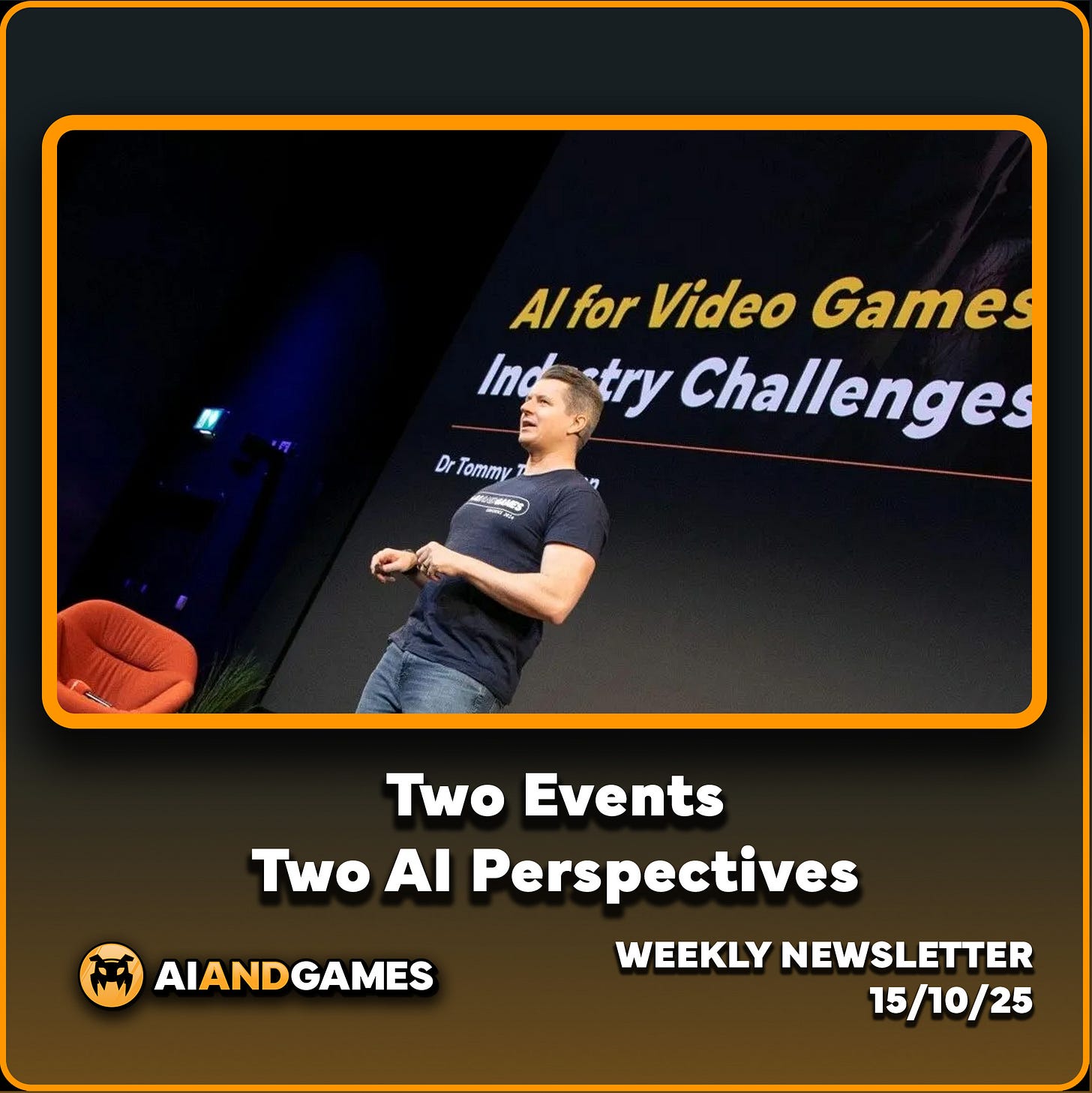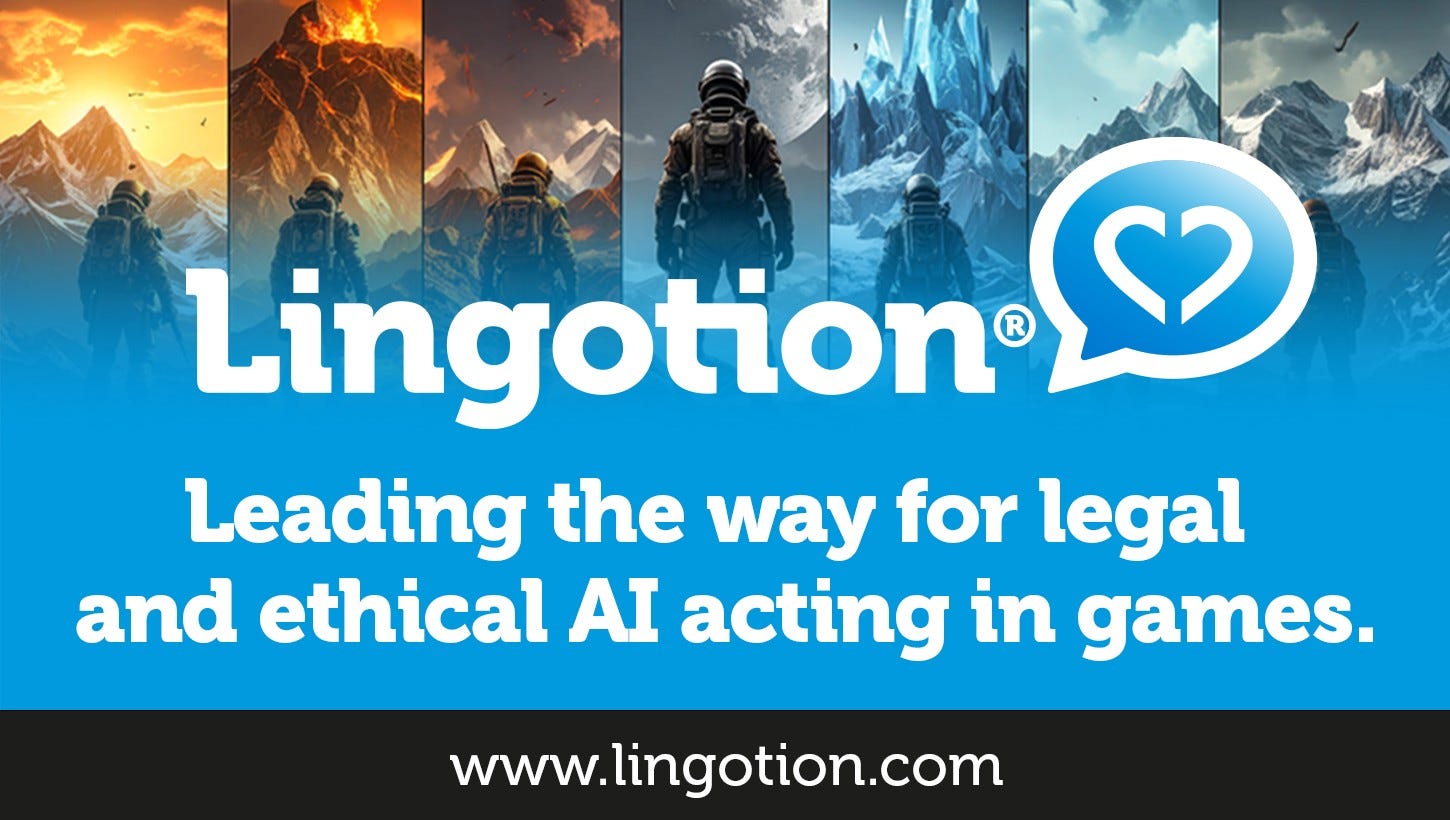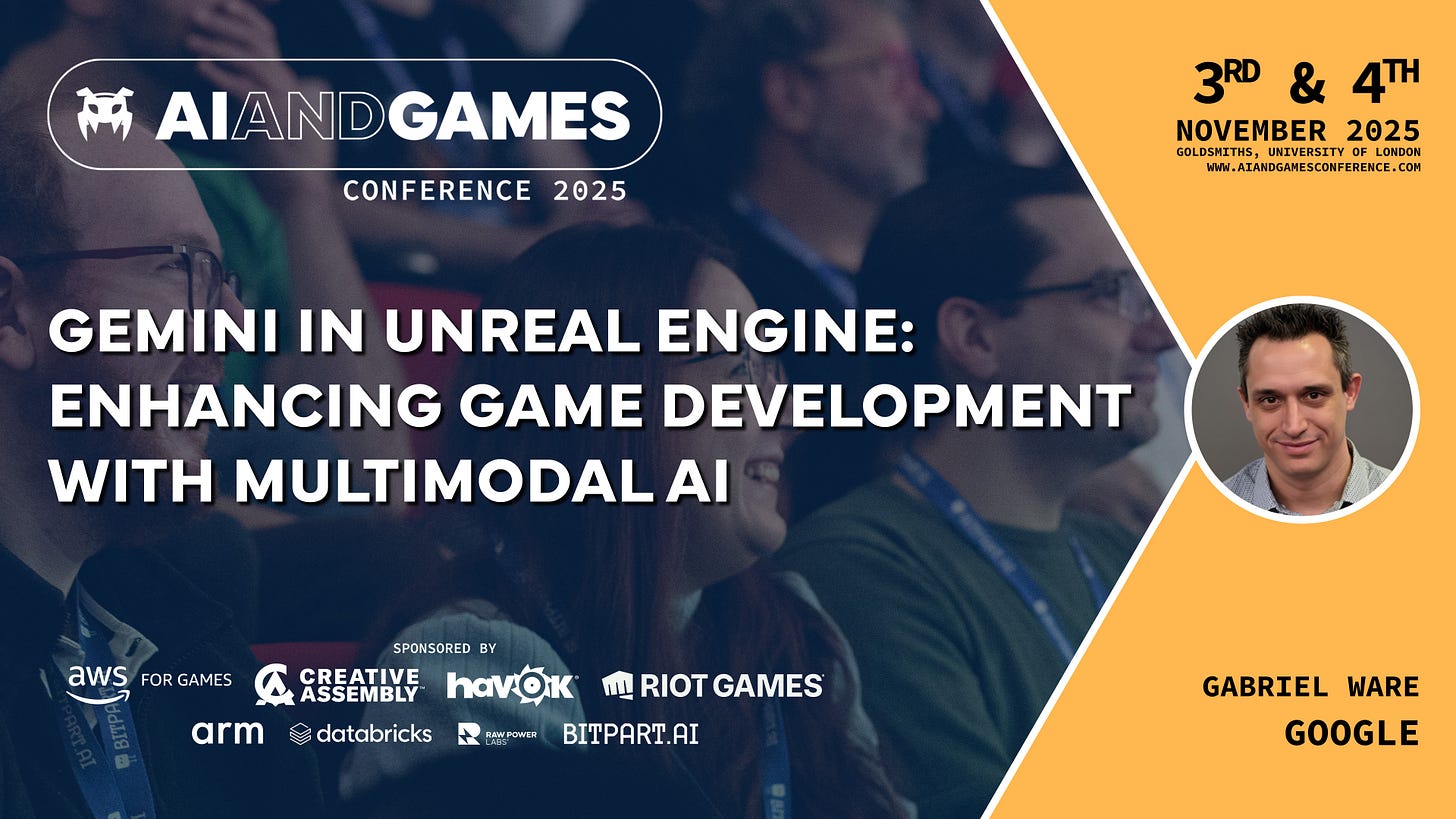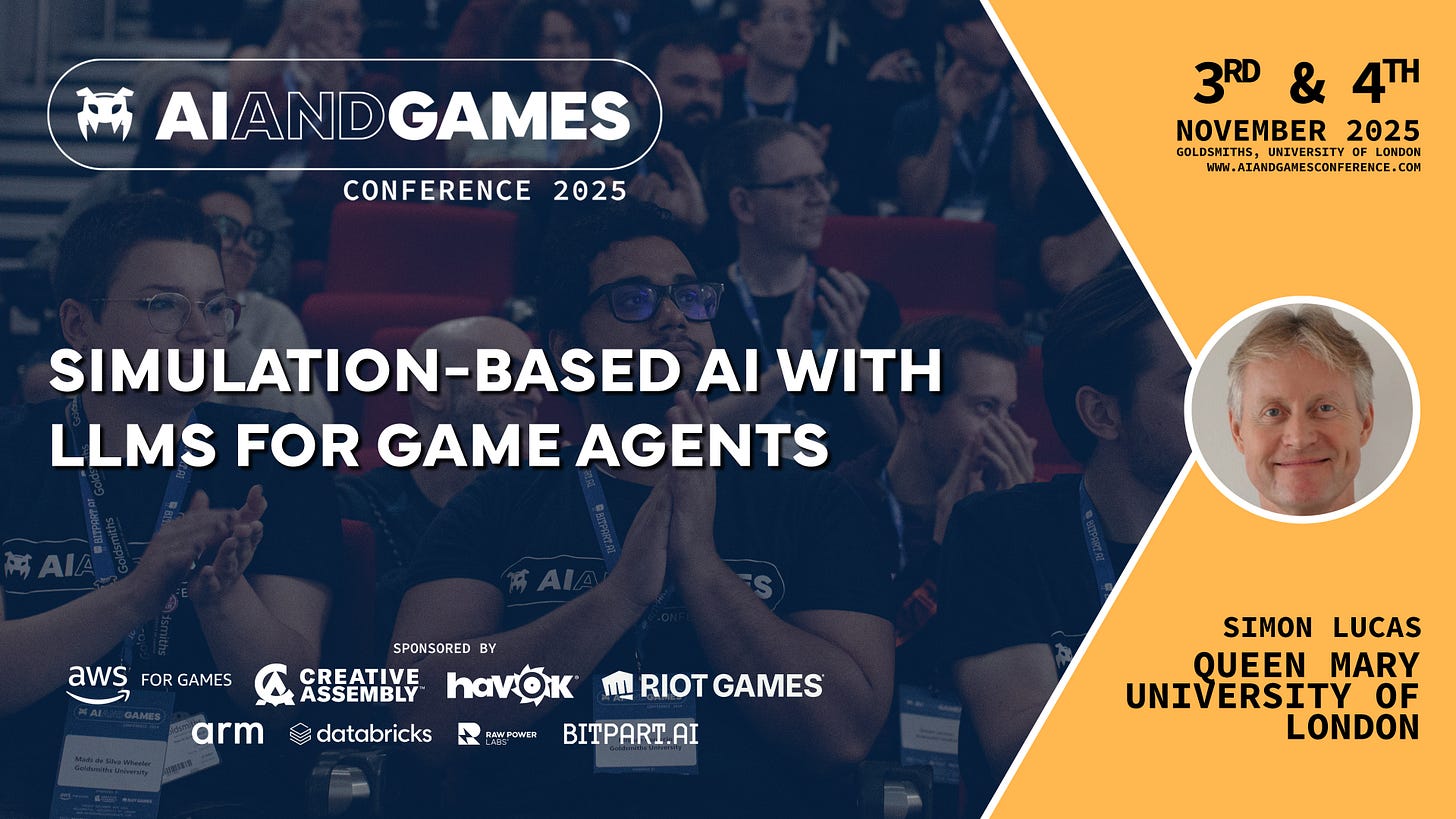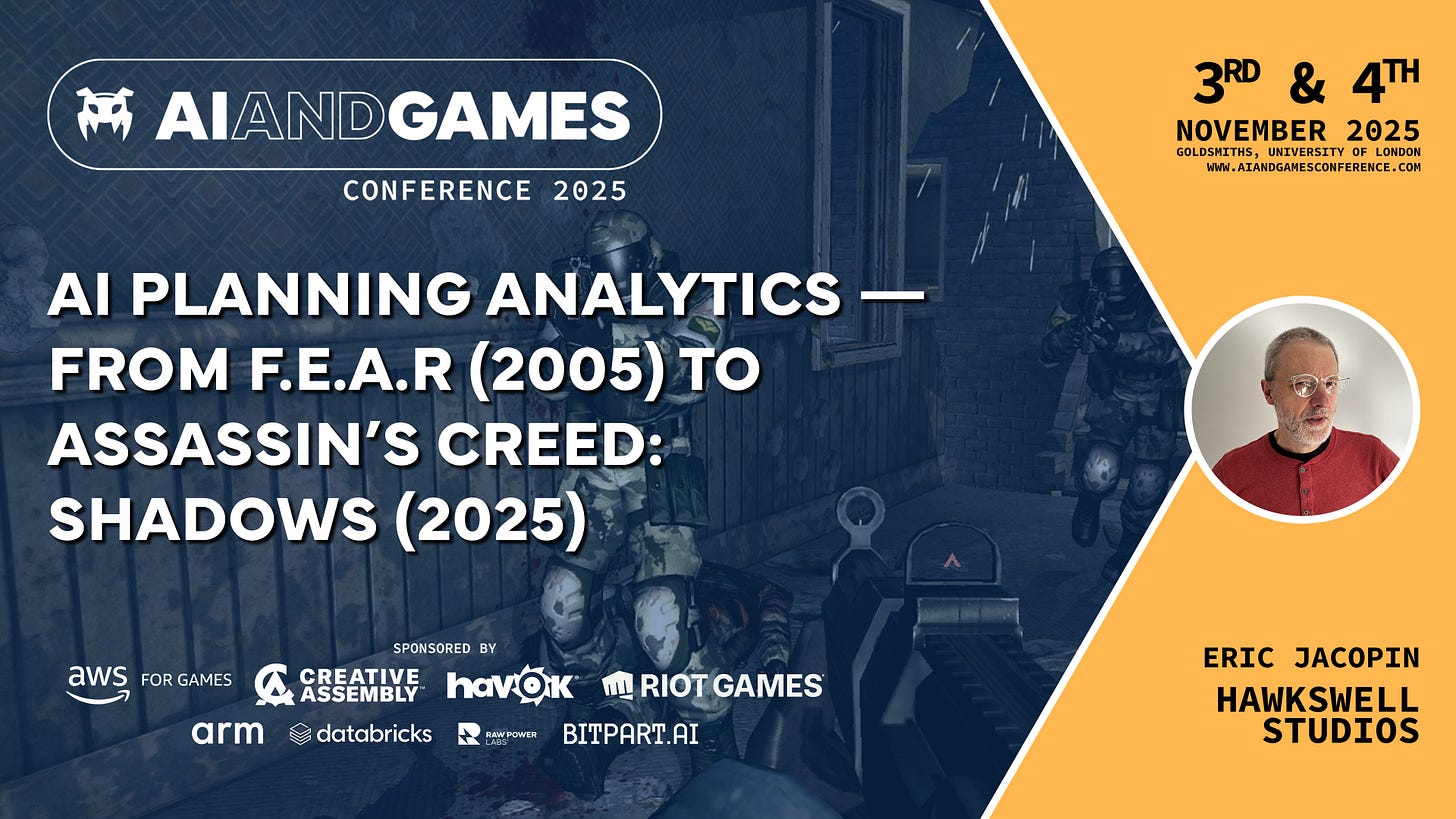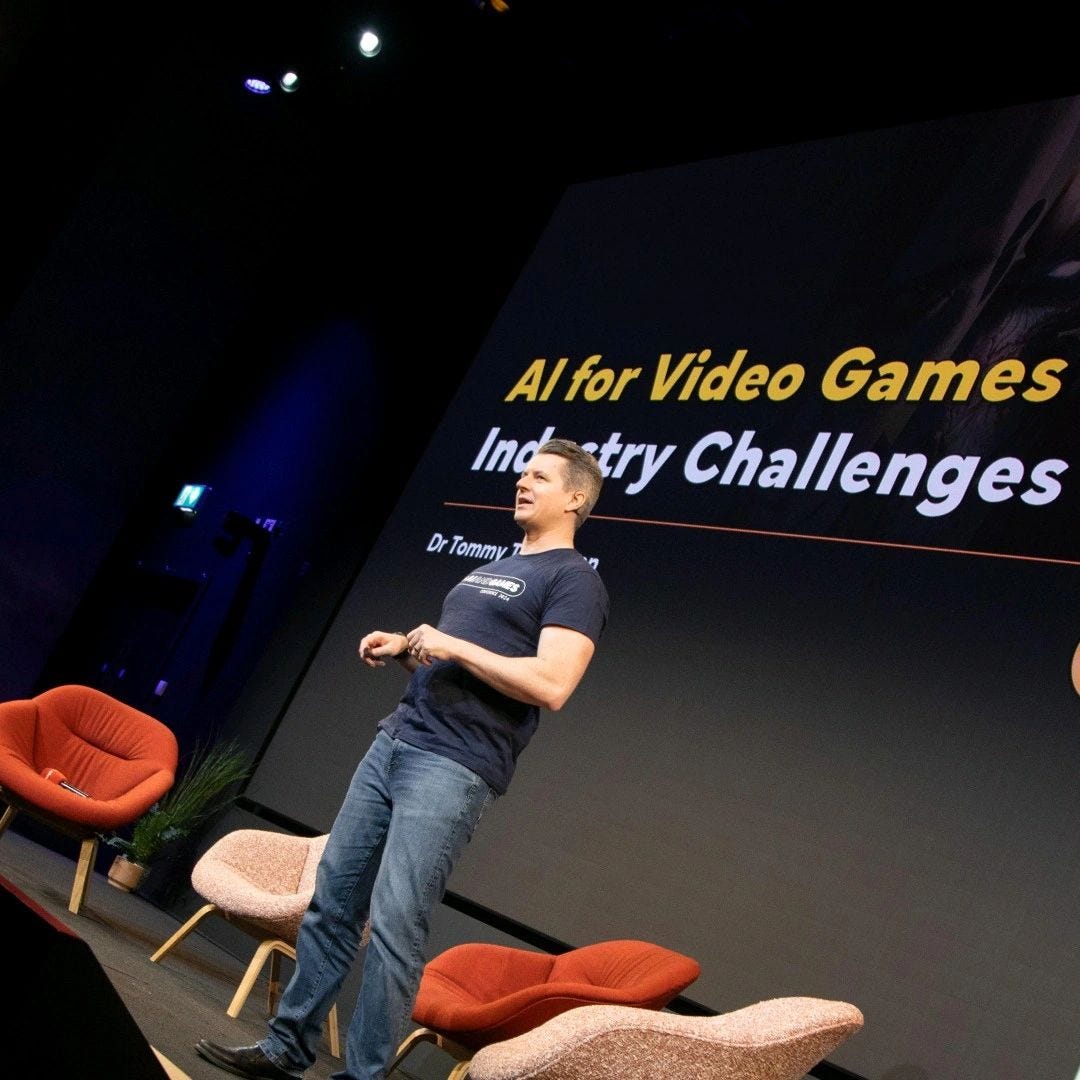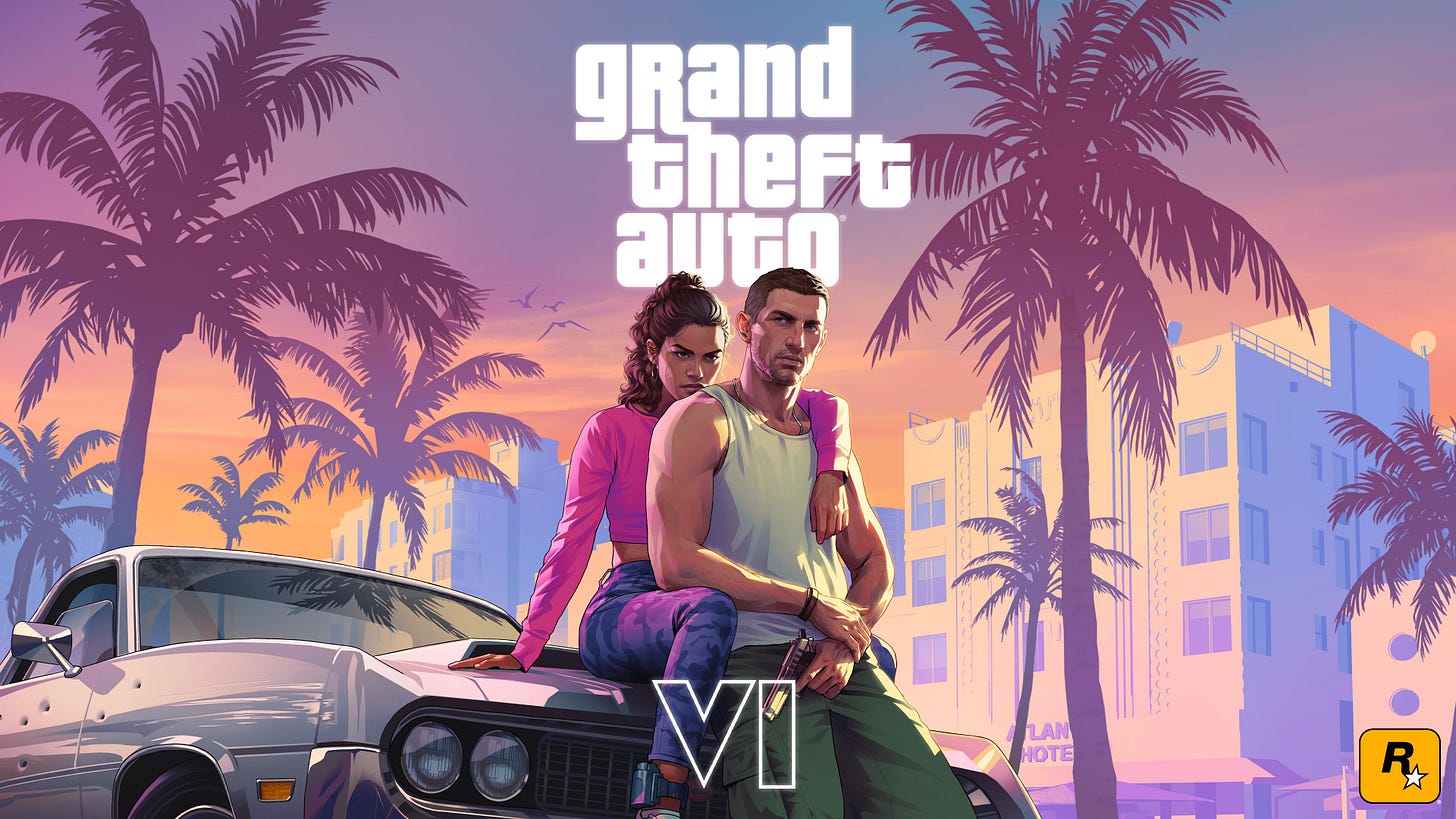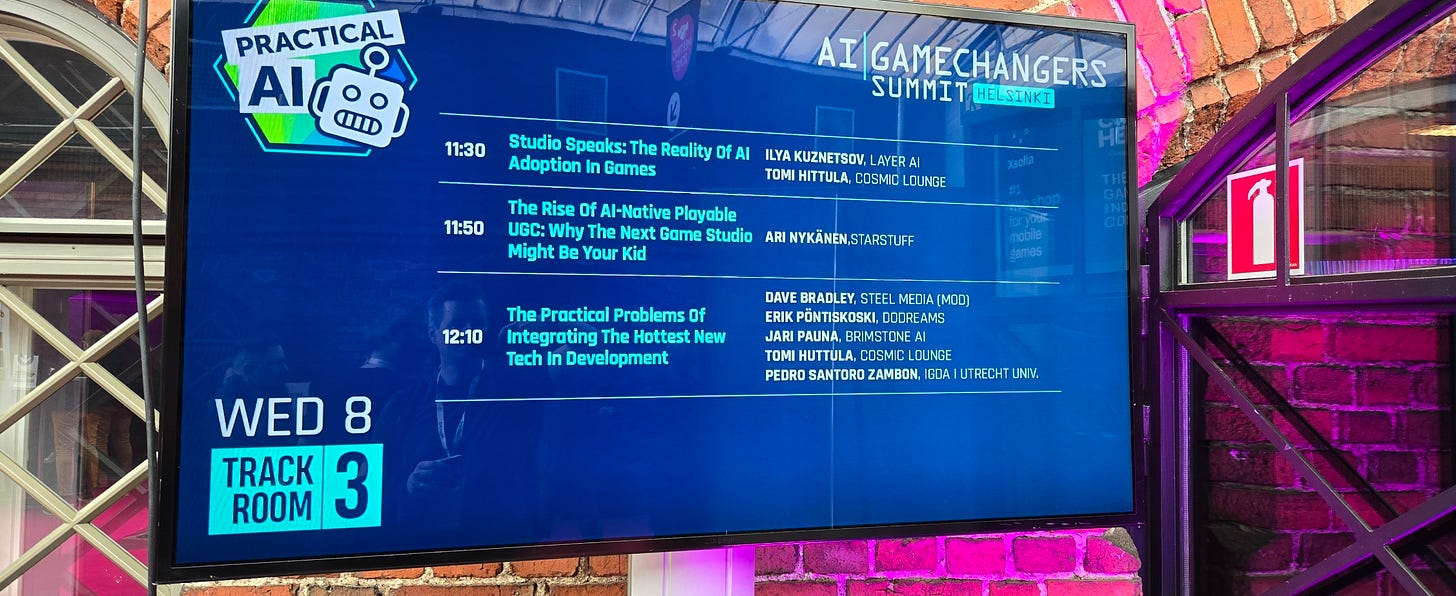Two Events, Two AI Perspectives | 15/10/25
Sponsored by Lingotion: leading the way on legal and ethical AI acting for games.
Catch our latest case study on AI research in Counter-Strike
Battlefield 6 devs insist no generative AI in the product.
The mobile industry seems very enthusiastic about AI.
The AI and Games Newsletter brings concise and informative discussion on artificial intelligence for video games each and every week. Plus summarising all of our content released across various channels, like our YouTube videos and in-person events like the AI and Games Conference.
You can subscribe to and support AI and Games, with weekly editions appearing in your inbox. If you'd like to work with us on your own games projects, please check out our consulting services. To sponsor, please visit the dedicated sponsorship page.
Hello and welcome to this week’s issue of the AI and Games newsletter. Time for another healthy dose of grounded game AI discourse - with but a hint of that all important Scottish twang (it’s hard to read but it is there, honest).
I’m slowly recovering from the past couple of weeks of travel. Having attended NEXUS in Dublin two weeks back, and then Pocket Gamer Connects in Helsinki last week, it’s been a rather exhausting - but fun - fortnight. Thank you once again to the organisers of both events, plus to everyone I had conversations with. Getting to engage with folks in their local industries about the challenges they face and perspectives they have is quite insightful.
For this week’s edition, I wanted to dive into those challenges and perspectives some more, and reflect on what people were talking to me about during those events. It’s an important reminder that while games is a global industry, each country’s industry and surrounding culture is undeniably unique.
But on top of all that, we have some conference announcements, some news, and a few other bits and pieces. Let’s do it!
Follow AI and Games on: BlueSky | YouTube | LinkedIn | TikTok
A Word From Our Sponsor
This issue of the AI and Games Newsletter is brought to by Lingotion, who are leading the way for legal and ethical AI acting in games.
I met Lingotion founder Andreas Rodman earlier this year at the AI and Games Summer School, and once again at Gamescom. During that time I learned a lot about how their company is approaching the use of AI in voice acting while ensuring they support voice and performance actors in an age of AI proliferation. We’ve since ran a formal interview digging into their processes and how they work to provide performers legal control and renumeration. It was a really interesting chat, and I look forward to sharing it with you on the site in the future.
But for now, you can find out more about Lingotion’s platform and their approach to supporting actors and performers through AI at lingotion.com
Announcements
A batch of things to stick in your eyeballs…
Congratulations to Dr Nathan John!
Congratulations to Nathan John who successfully defended his PhD thesis yesterday at Queen Mary University of London. He passed, subject to minor corrections, after a three-hour session assessed by Professor Simon Lucas- who as I will mention in a moment is a speaker at our 2025 conference - alongside yours truly. With Simon acting as the internal examiner (i.e. the assessor from inside the university) while I was the external examiner, who brings an outside perspective to the work. Nathan is part of the IGGI Centre for Doctoral Training that focusses on game research based at QMU and the University of York here in the UK.
His research thesis: “Adversarial Behaviour Debugging with Neuroevolution” explores how to use AI-based methods to help game AI programmers and designers find bugs in NPC behaviours. It’s a rather unique take on the ever growing space of AI applications for automated game testing, and it was a pleasure both to get a chance to review the work, and participate in the final assessment for the doctoral award. Thanks to Dr Jeremy Gow, Nathan’s supervisor, who invited me to be the external examiner.

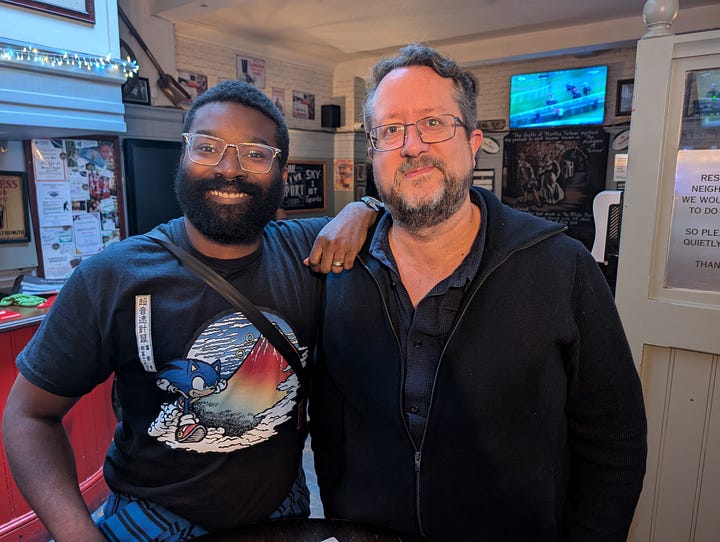
Surviving your PhD viva is no easy task. I often equate it to sitting an exam where you’re graded not just on how well you answered the paper, but you were also responsible for writing the exam too! Dr John did a great job responding to questions, and it was a really fun discussion - though I’m sure it wasn’t as fun for Nathan at times!
Congrats once again Nathan, and I wish you the best of luck in the future!
MLMove: The Language Model of Movement
Last week we published the first episode of the main AI and Games analysis series since we looked at Star Wars Outlaws earlier in the year. The Alien: Isolation retrospective on YouTube kind of broke us a little - but don’t worry, we recovered!
Last week we published episode 81 of our main case study series exploring MLMove: a research project conducted by (now graduated) PhD candidate David Durst at Stanford, that trained intelligent Counter-Strike bots through use of transformers - the technology we use to power large language models (LLMs).
Thanks once again to David for taking the time to sit down for an interview with us. It’s a really interesting project, and worth checking out!
AI and Games Conference 2025
We have a bunch of stuff to announce once again, as we’re only three weeks away from the big event! Tickets are still on sale now, but not for long!
Another Round of Talk Announcements
With the big event less than three weeks away, here’s a couple more talks to whet your appetite.
Gemini in Unreal Engine: Enhancing Game Development with Multimodal AI
Gabriel Ware, Juan David Hincapie-Ramos / Google
Integrating generative models into everything is very much in vogue these days. But how do you integrate in the likes of game engines such that it actually delivers value to the end user?
It’s exciting to see a collaboration between Google and Epic Games in trying to figure this out for Unreal Engine. Looking forward to what Gabriel Ware and Juan David Hincapie-Ramos share with us at this years event.
Simulation-Based AI with LLMs for Game Agents
Simon Lucas / Queen Mary University of London
Professor Simon Lucas has been at the forefront of AI research in games for over 20 years. Simon, his students, and the labs he has led have been an instrumental force in legitimising and normalising the academic study of games in AI communities - long before big tech realised we were onto something. His recent work on simulation-based AI sounds like an interesting evolution of his many years of research experimenting with game-playing agents. It’s another great addition to our programme, and I’m looking forward to checking it out.
AI Planning Analytics - From F.E.A.R. (2005) to Assassin’s Creed: Shadows (2025)
Eric Jacopin / Hawkswell
Oh boy, this talk is built for me. This is the sort of thing I love to see: a deconstruction of the evolution of planning AI technologies over the past 20 years since their first use in F.E.A.R. 20 years ago. Eric presented at our conference last year on a completely different subject - analytical geometry for computing valid locations to visit in game environments - and so it’s great to have him back with us. Prior to his career in the games industry, Eric spent around 25 years working in planning research - publishing papers that I have read over the years - so it’s great to have him come back to us and deliver once again on this topic.
Bumper Talk Issue Later This Week
Once again we’ll be publishing a bumper issue with the final batch of talks later. But also…
Full Schedule Now Live on the Website
Now yes, I am taking my time to announce all of the content here in the newsletter, but that’s because I feel it is my responsibility to give every single speaker a dedicated moment to share their awesomeness. However, for our more discerning readers, the full schedule is now live on the conference website!
AI (and Games) in the News
Only one news story worth reporting on this week…
Battlefield 6 Devs Clarify No Generative AI in the Product
With Battlefield 6 dropping last weekend, it’s time to compare it to Call of Duty once again, but this time on a different front: generative AI adoption.
A small but nonetheless interesting comment came up in an interview by BBC Newsbeat with Rebecka Coutaz, the VP general manager of Battlefield Studios in Europe (covering Criterion in the UK, and DICE in Sweden). The question being, is generative AI used during development in the latest entry of the series? To quote the article:
Rebecka tells Newsbeat players won’t see anything made by GenAI within Battlefield 6, but it is used in preparatory stages to “to allow more time and more space to be creative”.
Rebecka says GenAI “is very seducing”, but there isn’t currently a way to incorporate it into developer’s daily work.
So hey, it’s used during development, and but nothing in the final product. This contrasts with Call of Duty where earlier this year generative AI disclosures were added for the game on Steam given the technologies use in cosmetics and similar content.
A Tale of Two Cities…
Alrighty let’s bring this issue to it’s main topic! As discussed at the top, I’ve been on the road once again visiting events and sharing my perspectives on AI in the video games industry. Visiting Dublin a fortnight ago for the NEXUS conference, and then Helsinki for their annual iteration of Pocket Gamer Connects.
For me one of the most useful and interesting parts of these trips is engaging with the local game development scene - aka I chat with people. I always find this a really useful exercise given you not only get an insight into cultural differences, but also get an idea of the challenges being faced by each of those respective creative sectors.
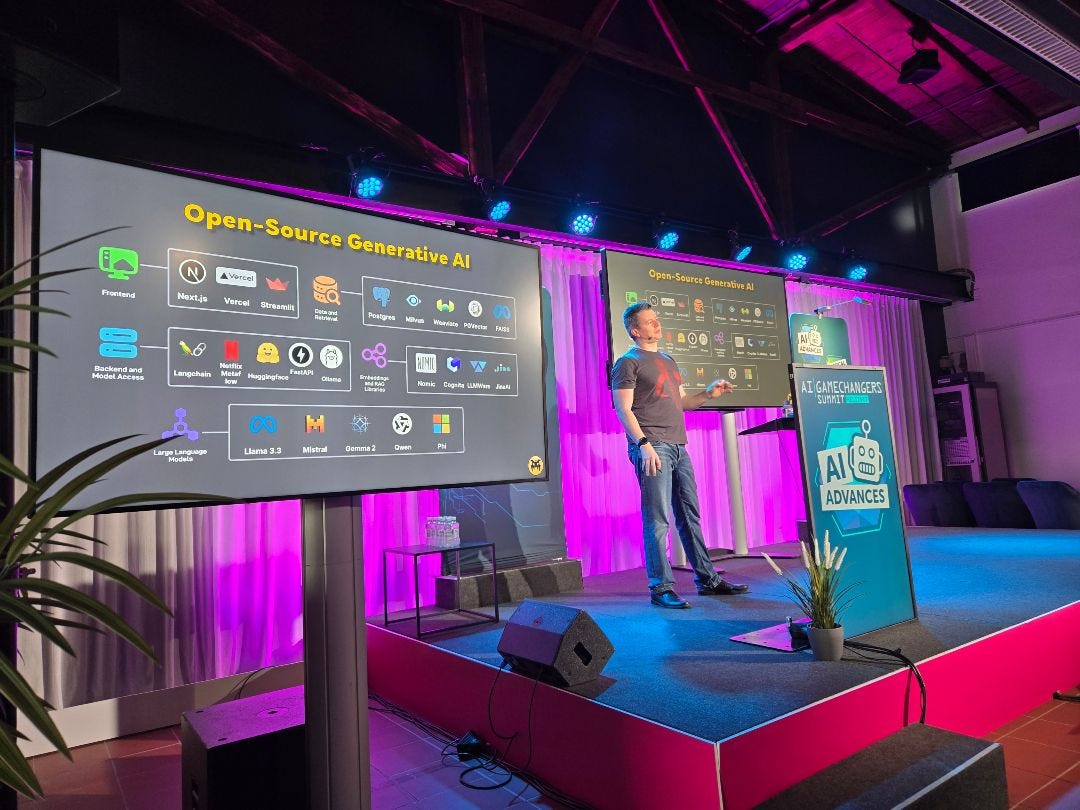
Unsurprisingly, no two games industries are the same. You can expect the Irish and Finnish sectors to differ quite a bit as a result of their cultural values, their geography, their economy, and much more besides. But equally they have different priorities and challenges that naturally have a lot of overlap but are reflective of the aforementioned factors. Plus it’s also valuable to me coming from the UK, where we often forget how big our industry is in comparison to others in Europe. While Germany rivals the UK in revenue, ol’Blighty still flies the flag as the largest industry in terms of number of organisations and active workers. With around 28,000 people working in the UK industry as noted by TIGA in 2024, while Germany sits around 12,000.
This always sits in the back of my mind when visiting events such as these, or in the past year when I’ve attended /Game/Dev in Rome, Konsoll in Bergen, and GDS in Prague. These communities have different challenges they face - many of which a reflection of their country’s politics, economies, and perceptions of games as an industry. How AI, or rather the broader conversation surrounding generative AI, fits into that equation becomes all the more interesting.
Irish Charm
So yeah two weeks back I was over in Dublin for NEXUS. This was my second time attending the event, and this talk acted as a follow-up to my ‘state of the industry’ talk I gave for them back in 2024.
Now as I discussed in the talk, we need to be looking more realistically about the message being presented about the viability of AI in game productions, and the reality of how games are actually built. In the past few years research innovations have become less about the material impact it has on the conversation around AI, but rather a means to boost stock valuations. While there are valuable innovations happening in the space, that we are finding interesting applications of generative AI that is not exploitative and legally dubious, we need to be vigilant against unrealistic perceptions of how expensive projects from big tech firms will yield material gains for everyone else.
Presenting this in Google’s Dublin offices was certainly a vibe!
But this certainly seemed to resonate with the audience. Like many crowds I’ve presented to in the past year or so, in the Irish crowd there is an interest and enthusiasm for AI but a lot of caution and (justified) scepticism towards embracing it wholeheartedly.
Now I suspect part of that is that there isn’t a huge AI sector, nor games sector, in Ireland itself. It’s a predominantly indie space, with a handful of either small teams with big success stories such as Romero Games or more recently StoryToys who developed Lego Bluey. Meanwhile the larger companies based in the likes of Dublin, Cork, and Galway are offices for larger corporations - such as Blizzard and two of our sponsors in Riot and Havok - where company mandate is often dictated elsewhere. As such, from my perspective it gives the Irish industry this weird situation of having its own identity and culture of game development, but it’s largely held aloft by larger corporations or products that support the sector.
Coming from Scotland, I can resonate with that greatly.
I think AI is but one of many issues or talking points in Ireland, but it’s not one of the bigger or more pressing ones. It is still a sector really cementing its own identity and communicating both to its government, and broader markets, of its value - and AI isn’t going to help with a lot of those challenges. With Screen Ireland and IMIRT - the Irish games industry association - working hard to provide funding opportunities and broaden access to resources.
All that said, I had some great conversations after my talk - which seemed to go down quite well. And our roundtable afterwards was really focussed on the issues of what value AI can bring, and what are the risks we need to be factoring into our development processes, and our legal assessments of the sector.

Meanwhile in Finland…
The perspective in Helsinki was quite different. I think this was driven by two factors, the first being that in the Finnish industry, mobile is a very big player, but also I was at an event that is predominantly focussed on the mobile sector.
When thinking of the games industry in Finland, you may think of genre-defining studios such as Control and Alan Wake 2’s Remedy Entertainment, or Colossal Order and their highly successful Cities [in Motion/Skylines] series, but it’s safe to say many of their biggest exports are in mobile gaming. With studios such as Supercell (Clash of Clans, Clash Royale), Rovio (the 101 entries of Angry Birds) and Metacore (Merge Mansion) having thousands if not millions of active players. It’s a larger sector than Ireland, and of course has its own challenges.
It was through this lens I saw a completely different level of enthusiasm around AI for games. This was in-part due to the content of the event, but the vendors also on display and the conversations being had. There are corners of the mobile space that are enthusiastic, perhaps a little too enthusiastic, about where AI can fit in their world. To a point that my talk - which was a shorter version of the same talk I delivered in Dublin - felt slightly out of place.
In fact I’d argue this was one of the most AI-enthused audiences I’ve seen yet, and I talk at games events all over the world…
Product Pipeline: After all, a big part of what helps drive the mobile market is a continuous stream of content going out to players. New updates need to go out frequently, and there’s a desire not just to create content quickly, but get it out to users to engage with it. I spoke with some attendees who highlighted that generative AI is now part of almost every aspect of their workflow. That rather than bring in more people to handle the workload - or rely on their expertise - their teams have moved almost entirely to using generative AI to speed things up - and save money along the way.
Meanwhile a lot of the programme was equally excited about the prospect of using AI for user-generated content (UGC), and how to use generative tools to fit into existing pipelines. Now it’s great to have these conversations, given it’s nice to hear from people who have tried this out to understand what viability it has, but I wonder if it’s simply feeding a crowd desperate for a solution? We’re focussed on the first half of the equation - what we did, or what we want to do - and not the second half - did it work? Time will tell I suppose.
Whale Hunting: Of course in mobile gaming the other big challenge is finding players (user acquisition), and then implementing effective monetisation strategies (i.e. getting your users to part with their cash) on them. Personally, it’s why I play very few mobile games, because often these strategies are quite aggressive. While some of the conversation in the afternoon was on using AI for user acquisition, plus there were several booths with companies selling their wares, I wonder how much of this is, dare I say, doing anything new? What is AI doing that suddenly empowers this corner of the sector? Are you unlocking some new axis from which to tackle this problem, or did you just change the marketing to lean on AI and they’re flogging the same old horse?
Do I sound cynical? Yes. But then I’ve yet to see the value this is bringing in. By all means if it’s working and people have the data to back it up, I’d love to see it personally and have that conversation. Plus I recognise my own preconceptions and dislike for mobile monetisation is colouring my judgement, but it does feel like AI is being used as a magical silver bullet to an unsolvable problem - where have I heard that before?
But Think of the Juniors: Now while it was interesting to see this level of engagement around (generative) AI, I equally heard from a number of people who were concerned about the state of the Finnish sector, and what impact AI was having on aspiring developers. While the industry is doing okay, it’s still a challenging space for people to make their mark and get into the space. I had some conversations with indies on the challenges of breaking out, and where generative AI is both helping and hindering them. Plus on the impact this has on students, and the long term implications for the industry - an evergreen topic I suspect in the coming years!
No Right Answers, Just More Questions
Presenting in two countries back-to-back always presents some interesting perspectives, but while many of the conversations I have are consistent from one place to another, the emphasis and priority of them shifts quite a bit.
Just before I wrap, a thank to you the teams at both NEXUS and PGC for having me present. I had a great time at both events. For now that’s the last speaking engagements I have planned for this year, given our conference in London is currently my top priority. But looking forward to getting back out on the road once I’ve managed a stable sleep schedule for a month or three…
Wrapping Up
I’m going to wrap this week with a game recommendation!
I noticed Is This Seat Taken? by Poti Poti Studio when it launched back in August and it’s got a very simple premise: you are responsible for organising seating arrangements for a collection of characters. But, each of them has pet peeves and desires that need to be satisfied in order to complete the puzzle.
Long story short, the player has to act as a constraint solver! I love that.
Check out the trailer above which clearly communicates what the game is about. You can find it on Steam and the Nintendo eShop now - plus it’s on mobile platforms. I’ve been playing it on my travels on my Switch 2 alongside the re-release of Super Mario Galaxy, and having a great time with it.



